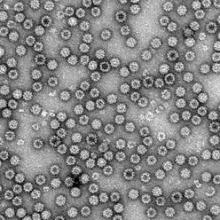An investigational norovirus vaccine was protective against Norwalk virus infection and its associated gastroenteritis in a proof-of-concept study reported in the Dec. 8 issue of the New England Journal of Medicine.
The two-dose, intranasal vaccine, which contains norovirus viruslike particles (VLP) plus the adjuvants chitosan and monophosphoryl lipid A, reduced the relative rate of infection by 26% and the relative rate of gastroenteritis by 47% compared with placebo.
The findings demonstrate that "it may be possible to use a vaccination strategy to prevent norovirus disease," which currently causes an estimated 21 million cases of gastroenteritis each year in the United States and 218,000 deaths among children alone, said Dr. Robert L. Atmar of Baylor College of Medicine, Houston, and his associates.
The double-blind clinical trial involved 98 healthy adults aged 18-50 years (mean age, 32 years) who were followed at four clinical sites. In the first phase of the study, subjects were randomly assigned to receive the study vaccine or placebo in two intranasal doses administered 3 weeks apart. Serum samples were collected another 3 weeks after the second dose was given, to assess immunogenicity.
Subjects who had not dropped out of the study at that time were eligible for the second phase, in which they underwent challenge by oral administration of Norwalk virus in an inpatient facility where they could be assessed for gastroenteritis and treated, if necessary.
A total of 89 subjects received both doses of placebo or vaccine, and 84 participated in the Norwalk virus challenge.
Norwalk infection, documented by assessment of stool samples, developed in 61% who received active vaccine and 82% who received placebo, for a relative reduction of 26%. Norwalk-associated gastroenteritis developed in 37% who received active vaccine and 69% who received placebo, for a relative reduction of 47%, the investigators said (N. Engl. J. Med. 2011;365:2178-87).
Moreover, the severity of gastroenteritis was significantly decreased among subjects who received active vaccine. The onset of illness also was delayed by several hours, although the overall duration was not significantly shorter with the active vaccine.
In all, 70% of the subjects who received active vaccine showed Norwalk virus–specific serum IgA antibody responses. "The frequency and magnitude of serum antibody responses after vaccination were lower than those induced by infection. Immunity after natural infection is short-lived [less than 2 years], and the duration of protection after vaccination remains to be determined," they noted.
"No vaccine-related severe adverse events occurred during the study, and no new medically significant conditions occurred," Dr. Atmar and his colleagues said.
The intranasal delivery system used in this study "malfunctioned several times, adversely affecting vaccine delivery. Alternative intranasal delivery systems and parenteral delivery of vaccine antigens are being evaluated to determine the optimal route of delivery," they added.
Future studies are needed to determine vaccine immunogenicity and protection in other patient populations, notably children and the elderly. "Also, it is possible that norovirus vaccines, like rotavirus vaccines, will provide greater protection against severe disease than against milder illness," they said.
This study was sponsored by LigoCyte Pharmaceuticals, maker of the vaccine, and the National Institutes of Health. Dr. Atmar reported being a consultant to GlaxoSmithKline, Novartis, and Haymarket Media; his associates reported ties to Novartis, Denka Pharmaceuticals, Global Vaccines, Immucell, and the EMMES Corporation.


